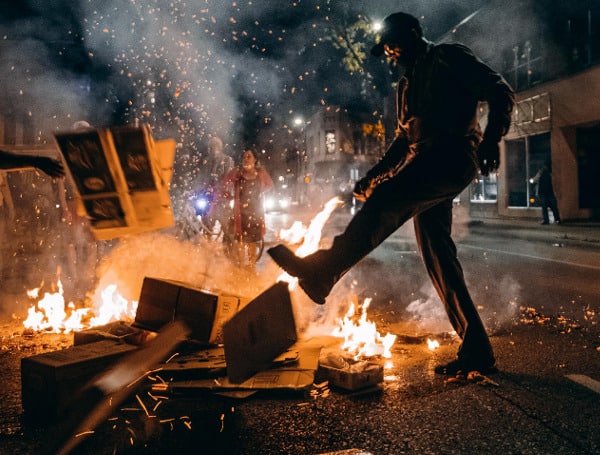A federal appeals court Tuesday turned to the Florida Supreme Court for help as it considers the constitutionality of a 2021 state law that enhanced penalties and created new crimes in protests that turn violent.
A three-judge panel of the 11th U.S. Circuit Court of Appeals sent the case to the Florida court because of what it called a “novel” issue — how to determine the meaning of the word “riot” in the law.
“The proper interpretation of the statutory definition is a novel issue of state law that the Florida Supreme Court has yet to address,” the panel said in a 29-page decision. “After careful consideration, we exercise our discretion to certify a question to that (Supreme) Court to determine precisely what conduct the definition prohibits.”
The move came as the panel considered a state appeal of a 2021 decision by Chief U.S. District Judge Mark Walker to issue a preliminary injunction against the law. Walker described the law as unconstitutionally “vague and overbroad.”
In the news: Lieutenant Gov. Jeanette Nuñez “We Have Solidified Florida’s Preeminence As The Freest State In The Union”
Gov. Ron DeSantis led efforts to pass the law after nationwide protests following the 2020 death of George Floyd, a Black man who was killed by a Minneapolis police officer. Dubbed the “Combating Public Disorder” law, the measure included a series of steps aimed at cracking down on protests that become violent.
But groups such as the Dream Defenders and the Florida State Conference of the NAACP challenged the law (HB 1), arguing that it would have a chilling effect on First Amendment rights. Walker issued a 90-page ruling that pointed to vagueness in the measure.
“Though plaintiffs claim that they and their members fear that it (the law) will be used against them based on the color of their skin or the messages that they express, its vagueness permits those in power to weaponize its enforcement against any group who wishes to express any message that the government disapproves of,” Walker wrote. “Thus, while there may be some Floridians who welcome the chilling effect that this law has on the plaintiffs in this case, depending on who is in power, next time it could be their ox being gored.”
The panel of the Atlanta-based appeals court heard arguments last March in the state’s appeal of the preliminary injunction. But in Tuesday’s decision, it said it was deferring a ruling on the preliminary injunction until after the Florida Supreme Court can weigh in on the definition of riot.
In the news: Florida Gov. Ron DeSantis Outlines Second-Term Environmental Plans
A federal appeals court Tuesday turned to the Florida Supreme Court for help as it considers the constitutionality of a 2021 state law that enhanced penalties and created new crimes in protests that turn violent.
A three-judge panel of the 11th U.S. Circuit Court of Appeals sent the case to the Florida court because of what it called a “novel” issue — how to determine the meaning of the word “riot” in the law.
“The proper interpretation of the statutory definition is a novel issue of state law that the Florida Supreme Court has yet to address,” the panel said in a 29-page decision. “After careful consideration, we exercise our discretion to certify a question to that (Supreme) Court to determine precisely what conduct the definition prohibits.”
The move came as the panel considered a state appeal of a 2021 decision by Chief U.S. District Judge Mark Walker to issue a preliminary injunction against the law. Walker described the law as unconstitutionally “vague and overbroad.”
Gov. Ron DeSantis led efforts to pass the law after nationwide protests following the 2020 death of George Floyd, a Black man who was killed by a Minneapolis police officer. Dubbed the “Combating Public Disorder” law, the measure included a series of steps aimed at cracking down on protests that become violent.
But groups such as the Dream Defenders and the Florida State Conference of the NAACP challenged the law (HB 1), arguing that it would have a chilling effect on First Amendment rights. Walker issued a 90-page ruling that pointed to vagueness in the measure.
In the news: USF Formally Opens Indoor Performance Facility; Still Looking At 2026 Or 2027 For On-Campus Stadium
“Though plaintiffs claim that they and their members fear that it (the law) will be used against them based on the color of their skin or the messages that they express, its vagueness permits those in power to weaponize its enforcement against any group who wishes to express any message that the government disapproves of,” Walker wrote. “Thus, while there may be some Floridians who welcome the chilling effect that this law has on the plaintiffs in this case, depending on who is in power, next time it could be their ox being gored.”
The panel of the Atlanta-based appeals court heard arguments last March in the state’s appeal of the preliminary injunction. But in Tuesday’s decision, it said it was deferring a ruling on the preliminary injunction until after the Florida Supreme Court can weigh in on the definition of riot.
Android Users, Click Here To Download The Free Press App And Never Miss A Story. Follow Us On Facebook Here Or Twitter Here. Signup for our free newsletter by clicking here.

